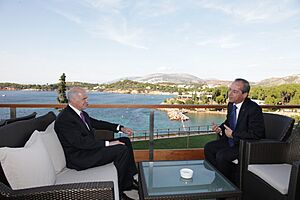Lawrence Gonzi facts for kids
Quick facts for kids
Lawrence Gonzi
|
|||||||||||||||||||||||||
|---|---|---|---|---|---|---|---|---|---|---|---|---|---|---|---|---|---|---|---|---|---|---|---|---|---|
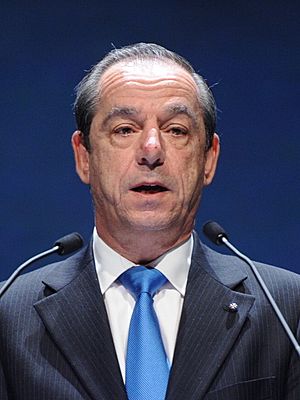
Gonzi in 2011
|
|||||||||||||||||||||||||
| 12th Prime Minister of Malta | |||||||||||||||||||||||||
| In office 23 March 2004 – 11 March 2013 |
|||||||||||||||||||||||||
| President | Guido de Marco Edward Fenech Adami George Abela |
||||||||||||||||||||||||
| Deputy | Tonio Borg (2008-2012) | ||||||||||||||||||||||||
| Preceded by | Edward Fenech Adami | ||||||||||||||||||||||||
| Succeeded by | Joseph Muscat | ||||||||||||||||||||||||
| Leader of the Opposition | |||||||||||||||||||||||||
| In office 6 April 2013 – 18 May 2013 |
|||||||||||||||||||||||||
| President | George Abela | ||||||||||||||||||||||||
| Prime Minister | Joseph Muscat | ||||||||||||||||||||||||
| Preceded by | Joseph Muscat | ||||||||||||||||||||||||
| Succeeded by | Simon Busuttil | ||||||||||||||||||||||||
| Leader of the Nationalist Party | |||||||||||||||||||||||||
| In office 3 March 2004 – 8 May 2013 |
|||||||||||||||||||||||||
| Preceded by | Edward Fenech Adami | ||||||||||||||||||||||||
| Succeeded by | Simon Busuttil | ||||||||||||||||||||||||
|
|||||||||||||||||||||||||
| Speaker of the House of Representatives | |||||||||||||||||||||||||
| In office 10 October 1988 – 5 December 1996 |
|||||||||||||||||||||||||
| Preceded by | Jimmy Farrugia | ||||||||||||||||||||||||
| Succeeded by | Myriam Spiteri Debono | ||||||||||||||||||||||||
| Personal details | |||||||||||||||||||||||||
| Born | 1 July 1953 Valletta, British Malta |
||||||||||||||||||||||||
| Political party | Nationalist | ||||||||||||||||||||||||
| Spouse | Catherine Gonzi née Callus | ||||||||||||||||||||||||
| Children | 3 | ||||||||||||||||||||||||
| Signature |  |
||||||||||||||||||||||||
Lawrence Gonzi (born 1 July 1953) is a Maltese politician and lawyer. He served in many important roles in Malta's government for 25 years. Gonzi was the Prime Minister of Malta from 2004 to 2013. He also led the Nationalist Party.
Before becoming Prime Minister, he was the Speaker of the House from 1988 to 1996. He also served as Minister of Social Policy and Deputy Prime Minister. As Prime Minister, Lawrence Gonzi guided Malta through its first years as a member of the EU. He helped Malta adopt the euro currency and join the Schengen Agreement.
Gonzi focused on making Malta's economy stronger and improving public services. He also played a key role in international events, like helping during the Libyan Revolution. He is known for his commitment to sustainable development and protecting the environment.
Contents
Early Life and Family
Lawrence Gonzi was born in Valletta, Malta, on 1 July 1953. His parents were Luigi and Ines Gonzi. He is the grandnephew of Mikiel Gonzi, who was the Archbishop of Malta.
He went to the Archbishop's Seminary for his early education. Later, he studied law at the University of Malta and became a lawyer in 1975. After working in a private law firm, he became a company lawyer.
Gonzi is very active in helping others. He has worked a lot with groups that support people with disability and mental health issues. He was also the first chairman of the national commission for persons with disability (KNPD). He is married to Catherine "Kate" Gonzi, and they have three children.
Political Journey
Speaker of Parliament
Lawrence Gonzi became involved in politics in the 1980s. After trying to get elected in 1987, he was chosen as the Speaker of the House of Representatives on 10 October 1988. The Speaker is like a referee in Parliament, making sure debates are fair and orderly.
During his time as Speaker, Gonzi made many improvements to how Parliament worked. He set up permanent committees and introduced new rules for debates. He was known for being calm and firm, which helped during difficult discussions.
Member of Parliament and Minister
In October 1996, Gonzi was elected as a Member of Parliament. He then became the Whip for the Opposition, helping to organize his party's members. He also served as the Shadow Minister for Social Policy.
When the Nationalist Party won the election in 1998, Gonzi became the Minister for Social Policy. He was also the Leader of the House of Representatives. From 1999 to 2004, he served as the Deputy Prime Minister.
As Minister for Social Policy, he worked on many important changes for Malta's economy and society. He helped create a new law for employment and industrial relations in 2002. He also helped set up the Malta Council for Economic and Social Development. This council allows different groups to discuss and suggest ideas for social and economic issues. These changes helped Malta prepare to join the European Union.
Becoming Prime Minister
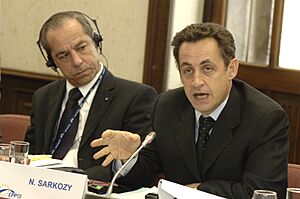
In March 2004, after Eddie Fenech Adami stepped down, Lawrence Gonzi was chosen as the new leader of the Nationalist Party. He became the Prime Minister of Malta on 23 March 2004. He also took on the role of Minister of Finance.
Malta joined the European Union on 1 May 2004. As Prime Minister, Gonzi attended the official ceremony in Dublin, Ireland. The Maltese flag was raised there for the first time with other EU member states.
As Finance Minister, Gonzi worked hard to meet the requirements for Malta to join the Eurozone. Malta successfully adopted the euro currency on 1 January 2008. He also focused on improving how public money was managed. He worked to make Malta more competitive in the global market. Gonzi encouraged new industries like information technology, biotechnology, and pharmaceuticals to come to Malta. His efforts helped Malta get €2.4 billion in EU funds from 2007 onwards.
His government's first goal was to move the country forward. They reformed different parts of the economy, including Air Malta and the Malta shipyards. These changes were important for Malta's growth after joining the EU. Gonzi also pushed for changes to the pension system to make sure it would last into the future.
Re-election and Challenges
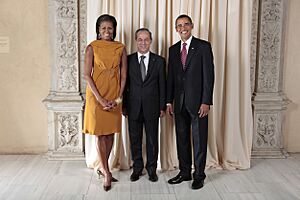
Lawrence Gonzi was re-elected Prime Minister on 8 March 2008, in a very close election. His party won by a small number of votes, giving them a one-seat majority in Parliament. This small majority later caused some challenges for his government.
In his second term, Gonzi focused on sustainable development and the environment. He also dealt with the effects of the 2008 financial crisis on Malta. His government started projects like SmartCity Malta and a new architectural project in Valletta. They provided financial help to local businesses to keep people employed. His economic policies were praised by European leaders.
Under his leadership, Malta's economy became more modern. It became an attractive place for foreign companies to invest in areas like financial services and technology.
Libya Policy
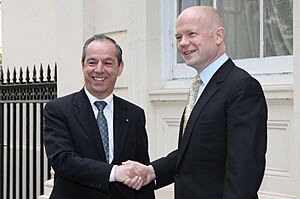
The Libyan crisis was a big challenge for Gonzi's government. He spoke out against the actions of the Gaddafi government early in the conflict. Malta became a safe place for people to be evacuated from Libya.
Gonzi's government provided help and medical aid to Libya. They also gave asylum to two Libyan pilots who refused to bomb protesters. Gonzi did not return the pilots' jets to the Gaddafi government. He allowed NATO planes to land in Malta when needed for the UN-approved no-fly zone. Malta's support for the Libyan revolution was appreciated by Libya's new leaders.
End of Term and Retirement
The small majority of Gonzi's second government led to some internal disagreements. In December 2012, his government lost a budget vote in Parliament. This meant the government could no longer continue. An election was held in March 2013, which the Labour Party won.
Gonzi accepted the defeat and resigned as leader of the Nationalist Party. He took "total and complete responsibility" for the election loss. He later admitted that his government might have made mistakes in its attitude.
Lawrence Gonzi became the Leader of the Opposition briefly in March 2013. He resigned from this role in May 2013 and from Parliament in July 2013. He said that someone with more energy should take his place. Since then, Gonzi has retired from active politics. He has given lectures at universities and attended conferences. He also led an observer group for the 2013 Maldivian presidential election.
Honours
National Honours
 Malta:
Malta:
 Companion of Honour of the National Order of Merit (2004) (This honour is given to Prime Ministers of Malta)
Companion of Honour of the National Order of Merit (2004) (This honour is given to Prime Ministers of Malta)
Foreign Honours
 United Kingdom:
United Kingdom:
 Honorary Knight Commander of The Most Excellent Order of the British Empire (2005)
Honorary Knight Commander of The Most Excellent Order of the British Empire (2005)
 Spain:
Spain:
 Knight Grand Cross of the Order of Isabella the Catholic (2009)
Knight Grand Cross of the Order of Isabella the Catholic (2009)
See also
 In Spanish: Lawrence Gonzi para niños
In Spanish: Lawrence Gonzi para niños
- Prime Minister of Malta
- List of prime ministers of Malta
 | William M. Jackson |
 | Juan E. Gilbert |
 | Neil deGrasse Tyson |


